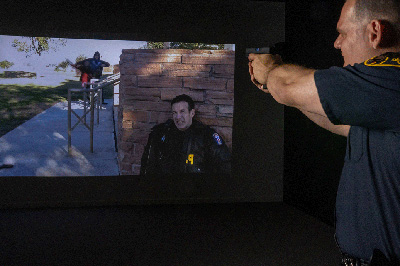
One of the more challenging aspects of law enforcement is dealing with people in crisis. In most of these situations, the only thing officers have control over are their own decisions and the tactics they employ to de-escalate the situation.
This type of training is critical to law enforcement because police officers employ de-escalation techniques daily. And like with any skill, the only way to improve de-escalation techniques is to practice them.
Very rarely are de-escalation tactics reported by officers on-the-job. This can make it challenging to find patterns, work on corrections, and focus on practical training for the future. That is why officers need to participate in ongoing training that teaches the power of persuasion, how to make contact, and how to focus on the outcome.
De-Escalation Training: Why It’s Important
Regardless of the situation, several critical components are involved in de-escalation, which is essential to a positive outcome. If they aren’t practiced together in an educational environment, then they will most likely not be deployed in a way that supports the end goal.
The essential steps involved in de-escalation training are:
- Listening to Dispatch - Getting good information from dispatch is a critical first step in mitigating a potentially dangerous situation.
- Establishing Contact - If a person is unwilling or unable to listen to an officer, the de-escalation process stops before it even begins.
- Controlling Your Emotions - To focus on a positive outcome, you must go in with a positive and professional attitude.
- Practice Tactical Breathing - Maintaining a low heart rate and a calm brain when dealing with a quickly escalating situation is critical.
- Power of Persuasion - When it comes down to it, the success of de-escalation relies solely on your ability to persuade a positive outcome effectively.
All of these steps require frequent practice and feedback on performance. Since it is often difficult to get this kind of feedback after an actual crisis, it’s vital to engage in extensive training that breaks down the potential outcomes, the missed steps, and things that could be improved. It is this type of real-world de-escalation training that can make all the difference for officers on-the-job.
De-Escalation Training: Benefits of Life-Like Training
Effective de-escalation techniques re-engage the frontal lobe of a person’s brain, regulating impulse control and improving rational thought and self-awareness.
This is something that is genuinely challenging to teach and practice in a classroom setting. Virtual gun ranges can offer a safe and educational alternative to traditional classroom-style education. Officers can engage in situational training simulations that mimic crises they are faced with on the job. By acting out the scenario, going through the de-escalation steps, and getting productive criticism on their performance, they will be more equipped to handle these situations in the future.
Ultimately, when it comes to de-escalation techniques, nothing will outweigh the benefits of hands-on practice. Engage Virtual Range offers a safe and realistic environment for law enforcement professionals to engage in life-like simulations that promote learning and build confidence.
Learn more about EVR and our unique capabilities to cater to the needs of law enforcement.